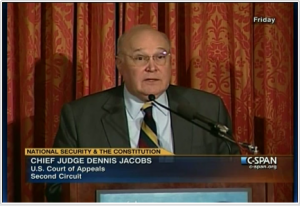By Brittny Drye
 The Second Circuit Court of Appeals in New York has ruled against the Defense of Marriage Act on Thursday in the case, Windsor v. United States, the second federal court to do so.
The Second Circuit Court of Appeals in New York has ruled against the Defense of Marriage Act on Thursday in the case, Windsor v. United States, the second federal court to do so.
Windsor, 83, challenged Section 3 of DOMA, which prohibits the federal government from recognizing same-sex unions, even ones conducted in states that honor marriage equality. When her wife, Thea Spyer, passed away in 2009, Windsor was forced to pay more than $363,000 in estate taxes to the IRS, even though the couple’s legal Canadian marriage was recognized by their home state of New York. She challenged the law as a violation of equal protection, and a federal trial judge in New York upheld her claim in June.
The three-judge panel ruled 2-1 against DOMA, with notoriously conservative Chief Judge Dennis Jacobs penning the opinion:
“[W]e conclude that review of Section 3 of DOMA requires heightened scrutiny. The Supreme Court uses certain factors to decide whether a new classification qualifies as a quasi-suspect class. They include: A) whether the class has been historically “subjected to discrimination,”; B) whether the class has a defining characteristic that “frequently bears [a] relation to ability to perform or contribute to society,” C) whether the class exhibits “obvious, immutable, or distinguishing characteristics that define them as a discrete group;” and D) whether the class is “a minority or politically powerless.” Immutability and lack of political power are not strictly necessary factors to identify a suspect class. Nevertheless, immutability and political power are indicative, and we consider them here. In this case, all four factors justify heightened scrutiny: A) homosexuals as a group have historically endured persecution and discrimination; B) homosexuality has no relation to aptitude or ability to contribute to society; C) homosexuals are a discernible group with non-obvious distinguishing characteristics, especially in the subset of those who enter same-sex marriages; and D) the class remains a politically weakened minority.”
With each federal strike down, the probability of the Supreme Court ruling against DOMA increases, which would obviously be a sweeping victory for same-sex marriage. The Supreme Court is expected to take on DOMA later this year.
Photo: thinkprogress.org
MOST VIEWED STORIES
- These nonbinary cosplay lovers brought anime to life for their ethereal wedding
- Sweet lesbian proposal on a gondola [VIDEO]
- Navy and green wedding for Disney lovers in Beacon, New York
- Ensuring Inclusivity: 5 Considerations for Guests with Disabilities on Your Wedding Day
- Greenhouse wedding in Downtown Los Angeles for two brides



























